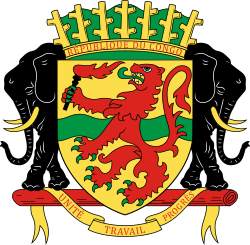| ||||||||||||||||||||||
| Results | ||||||||||||||||||||||
|---|---|---|---|---|---|---|---|---|---|---|---|---|---|---|---|---|---|---|---|---|---|---|
| ||||||||||||||||||||||
| Source: African Elections Database | ||||||||||||||||||||||
 |
|---|
A constitutional referendum was held in the Republic of the Congo on 20 January 2002, with results showed over 87% voted in favour with a voter turnout of 77.5%.
| ||||||||||||||||||||||
| Results | ||||||||||||||||||||||
|---|---|---|---|---|---|---|---|---|---|---|---|---|---|---|---|---|---|---|---|---|---|---|
| ||||||||||||||||||||||
| Source: African Elections Database | ||||||||||||||||||||||
 |
|---|
A constitutional referendum was held in the Republic of the Congo on 20 January 2002, with results showed over 87% voted in favour with a voter turnout of 77.5%.
The proposed new constitution would make the country a presidential republic. It had been written in 2001 and approved by a National Transitional Council in 2002 before being put to a referendum. [1] Changes from the old constitution increased presidential terms to seven years and abolished the post of Prime Minister. [2] It established a bicameral legislature and instituted several requirements in order to be able to stand for President. [3]
The government described the referendum as paving the way for elections and welcomed the results. [4] However the opposition urged that voters boycott the referendum as they said that the new constitution would give too much power to the President. [4] Human rights groups said that the referendum, which took place without international observers, had seen irregularities. [4]
| Choice | Votes | % |
|---|---|---|
| For | 1,113,955 | 87.83 |
| Against | 154,375 | 12.17 |
| Invalid/blank votes | 49,908 | - |
| Total | 1,318,238 | 100 |
| Source: African Elections Database | ||